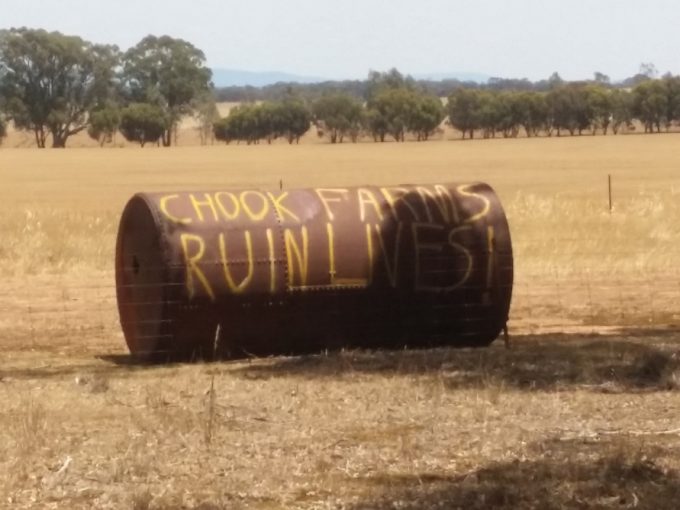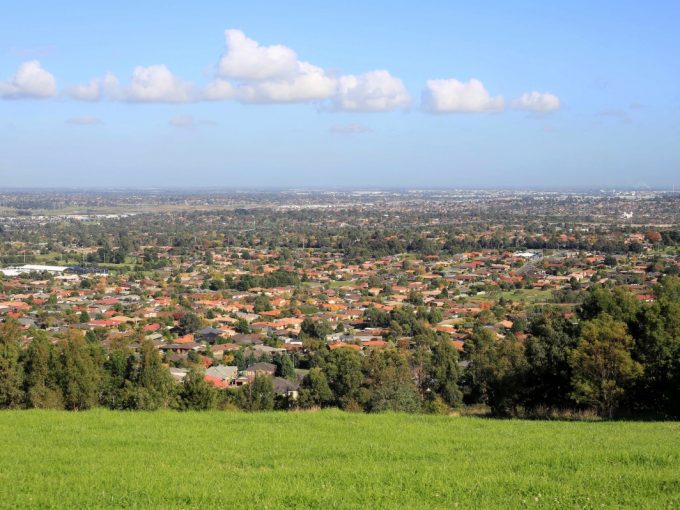While many of us can barely imagine what a million chickens in a shed might look or smell like, peri-urban and rural communities often have firsthand experience. Australians consume a lot of cheap chicken, but planning conflicts show not everyone appreciates an intensive chicken factory as a neighbour.
[soundcloud url=”https://api.soundcloud.com/tracks/266129842″ params=”color=effb00″ width=”100%” height=”166″ iframe=”true” /]
Australians consume over 600 million chickens each year. The vast majority are grown in intensive, vertically integrated factory farming operations called ‘broiler’ farms – some of which house over a million chickens at any one time.
While many of us can barely imagine what a million chickens in a shed might look or smell like, peri-urban and rural communities often have firsthand experience.
Australians consume a lot of cheap chicken, but planning conflicts show not everyone appreciates an intensive chicken factory as a neighbour. Factory farms are a frequently polarising form of agriculture.
In this episode, SoundMinds Radio producer Liz Taylor visits the Victorian town of Castlemaine near a growing cluster of contentious large-scale commercial chicken farms. One recent proposal has seen over two years of planning dispute and may result in Supreme Court action.
Liz speak with La Trobe Bendigo researcher Dr Andrew Butt about his research into rural land use planning issues and the pressures of the increasing scale of agricultural systems. Liz also speaks to a local resident who leads a local group concerned about the local impacts intensive farms.
This is a story about how urban planning works in rural areas. As intensive agriculture increases in scale, it causes planning conflicts and places pressures on established practices and regulations.
Urban planning comes from an urban tradition, and typically the theories used for thinking about the rural and the urban divide can be quite blunt. ‘Farms’ go in rural zones. But if 21st century farming looks like a million chickens in a shed, a ‘factory’ farm, certainty about what a farm is and where it belongs becomes clouded.
Andrew discusses the challenges for planning systems and the risks of trying to close down political discussions about the ethics and impacts of factory farming.
Featured
Dr Elizabeth Taylor, RMIT University – Producer
Elizabeth is a Vice Chancellor’s Post-Doctoral Research Fellow in the Centre for Urban Research at RMIT University. Her interests are in policy-focused research across urban planning, housing markets, property rights and locational conflict and her research often makes use of Geographical Information Systems (GIS). An increasing research focus is car parking policy. Elizabeth’s publications have explored the housing market implications of urban containment policies; the contested role of research in planning practice; and the ‘Not in My Back Yard’ (NIMBY) phenomenon. The latter includes food, waste and animal-based land uses – like intensive chicken farms – that expose contradictions in the distribution of rights associated with production and consumption.
Dr Andrew Butt, La Trobe University
Dr Andrew Butt is a Senior Lecturer at La Trobe University with over 20 years practical experience in planning practice, education and research. He has a strong teaching and research interest in rural landscape change and the interaction of planning systems and agricultural restructuring, particularly in peri-urban areas. His research and practice has involved analysis of farmland change, developing scenarios for land development in rural areas and work on the promotion of local food systems. He has also been involved in policy development and research in the areas of intensive farming and land use conflict with a focus on planning systems and practice.
Originally published on SoundMinds Radio.





